Industry Minister Agus Gumiwang Kartasasmita: No Bailout Discussion
Interviews with Industry Minister Agus Gumiwang Kartasasmita and Sritex President Commissioner Iwan Setiawan Lukminto on the company’s bailout.
maaf email atau password anda salah

Interviews with Industry Minister Agus Gumiwang Kartasasmita and Sritex President Commissioner Iwan Setiawan Lukminto on the company’s bailout.
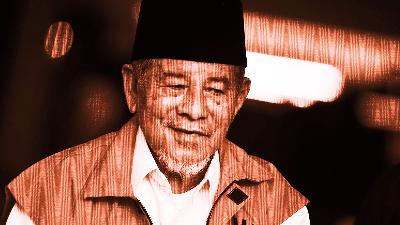
The term “Medan Block” emerged during the trial of former North Maluku Governor, Abdul Gani Kasuba. Medan Block is believed to refer to pre-allocated nickel mining concessions in Halmahera.
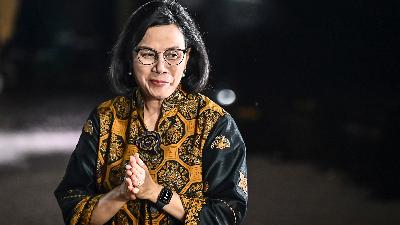
Sri Mulyani and several economic ministers from Jokowi join Prabowo’s cabinet, with encouragement from two former presidents.

Indonesia’s delegation at COP16 CBD in Cali, Colombia, is not led by a minister. Biodiversity funding is at risk of not being agreed upon.

A number of policies from Minister Sakti Wahyu Trenggono are riddled with conflicts of interest. They benefit his son, Indra Trenggono.

Explanations from State Secretary Minister Pratikno and Maritime Affairs and Fisheries Ministry on fishery business and the case of illegal ships in eastern Indonesia.
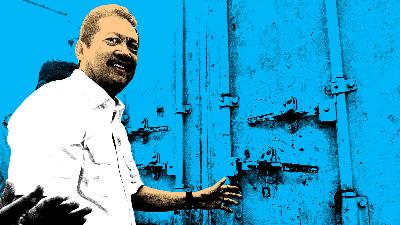
Minister Sakti Wahyu Trenggono revives a shutdown port. There is indication that the minister’s son is involved in the fisheries business.

Tempo’s interview with Minister of Communication and Informatics Budi Arie Setiadi about Jokowi’s campaign before the end of his tenure.
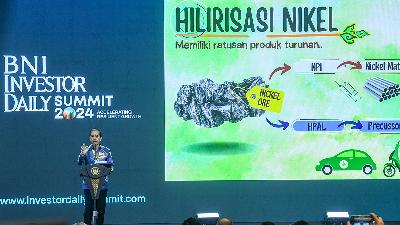
Jokowi’s campaign promoting his successes is considered as not portraying actual conditions. Customary communities are among the victims of his administration.

Trade Minister Zulkifli Hasan on the issues ranging from sea sand export policy to Prabowo Subianto’s bureaucratic management style.

There is a strong aroma of politics around the appointment of Saifullah Yusuf as Minister for Social Affairs. President Jokowi should focus on dealing with the problems of poverty.
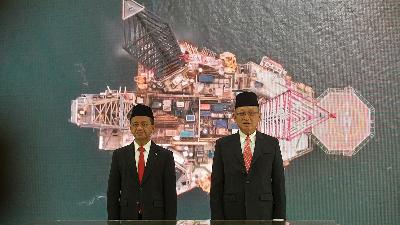
Just months before the end of his term, Jokowi appointed Bahlil Lahadalia as Energy and Mineral Resources Minister. The position is considered prone to conflicts of interest.
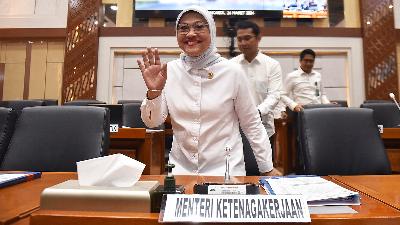
Minister of Manpower Ida Fauziyah explains the issues surrounding the mass layoffs in the industrial sector.

The willingness on the part of Muhammadiyah and Nahdlatul Ulama to accept mining concessions will turn into a problem. This is prone to corruption and could lead to horizontal conflicts.
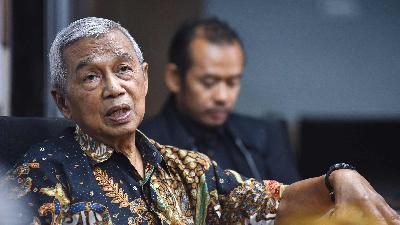
Muhammadiyah accepts the government’s mining concession offer. Many members are against it. Busyro Muqoddas, Chair of Muhammadiyah’s Law and Human Rights Council explains.

Muhammadiyah cadres and administrators are divided in their response to the mining concession. There are whispers from the government and the entrepreneurs.
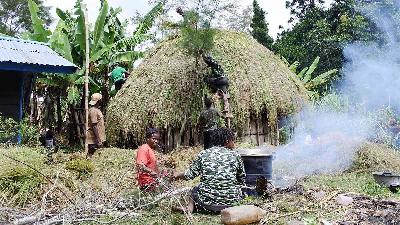
The Papua conflict continues to rage during Jokowi’s administration. The fate of the refugees is neglected.
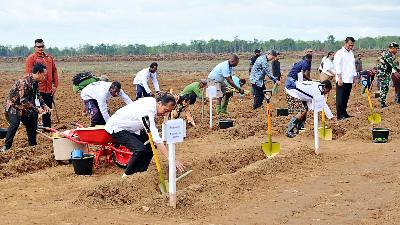
In a decade of Jokowi’s administration, deforestation reached 4.37 million hectares. This is partly attributed to national strategic projects in the food and energy sectors.
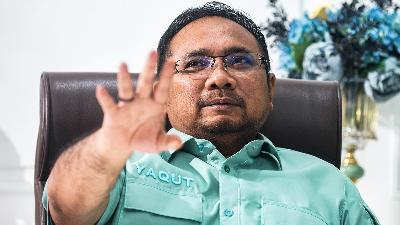
The DPR and the Religious Affairs Minister disagree regarding an additional quota of haj pilgrims. The DPR deems Yaqut Cholil Qoumas has broken the law.

The Ministry of Education, Culture, Research and Technology clarified the matter of the network of professor assessment teams. It is suspected that journals were engineered in addition to suspicious transactions.
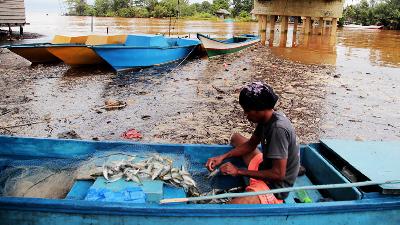
Indigenous people and villagers in Central Halmahera are facing clean water crisis. Community wells and river water are contaminated by nickel mining.

Communication and Informatics Minister Budi Arie explains the cyberattack on the Temporary National Data Center. He dismisses allegations of negligence.

Infinite Earth responds regarding the revocation of Rimba Raya Conservation’s ecosystem restoration permit.

The government grants mining concessions to religious organizations. What are the considerations behind the policy?
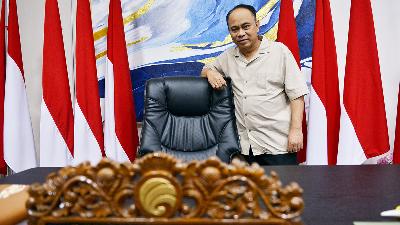
Communication and Informatics Minister Budi Arie Setiadi talks about the polemic over the planned revision of the Broadcasting Law and the Starlink Internet service.
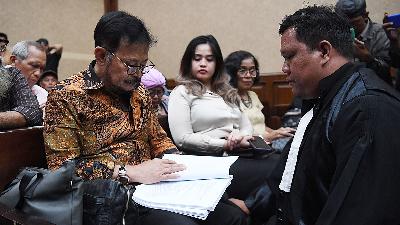
Agriculture Ministry high-ranking officials routinely took up collections to raise money for Syahrul Yasin Limpo from 2020 to 2023. They often used the treasurer’s cash account.
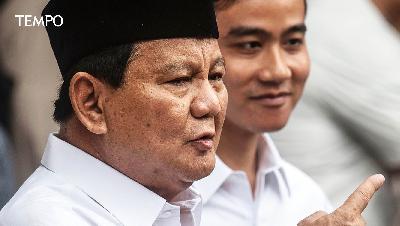
Prabowo Subianto intends to form a cabinet of 40 ministers. This will result in a bloated bureaucracy and wasted public money.

Illegal tin mining is rampant in the waters of Bangka Belitung. The environmental damage is much greater than investigators estimated.
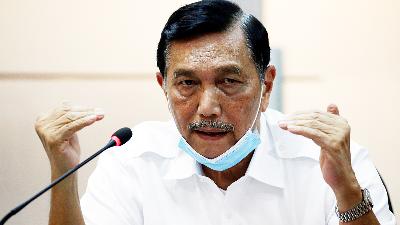
An interview with Coordinating Minister for Maritime Affairs and Investment Luhut Pandjaitan on mining permits for mass organizations and his relationship with Bahlil Lahadalia.
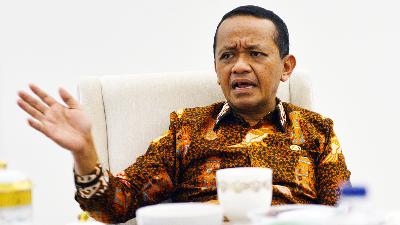
Interview with Minister of Investment Bahlil Lahadalia about mining business permits IUP for mass organizations, and the debate with Luhut Pandjaitan.
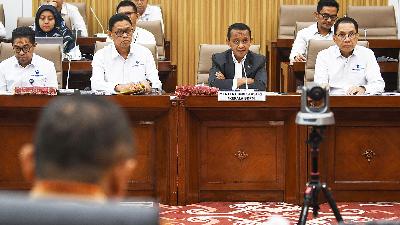
The role of Bahlil Lahadalia in revoking mining business licenses draws attention of the House of Representatives and civil society groups, amidst concerns of possible licensing corruption.
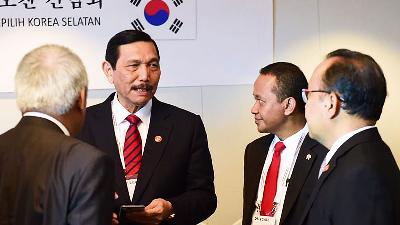
Luhut Pandjaitan and Bahlil Lahadalia discussed the allocation of mining permits. For the sake of delivering Jokowi’s promise.

The legalization of illegal mining and oil palm plantations in forest areas is rife with irregularities. This is plundering of natural resources using the Job Creation Law.
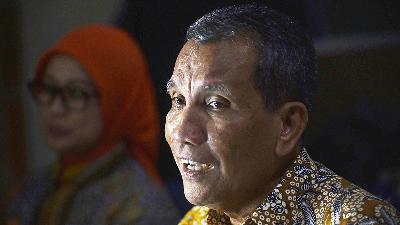
Corruption Eradication Commission’s Deputy for Prevention, Pahala Nainggolan, on the mechanism of administrative sanctions for companies mining illegally in forest areas.
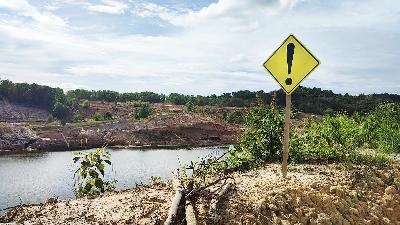
Administrative fines for whitewashing illegal mining are deemed ineffective to battle environmental damage. The fines are also vulnerable to corruption.

Bahlil Lahadalia explains the uproar over the revocation of mining permits as well as alleged extortion of money and shares in exchange for reinstatement of the permits.
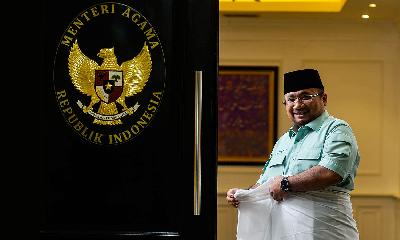
Religious Affairs Minister Yaqut Cholil Qoumas explains the regulation regarding the use of loudspeakers in mosques and outlines plans to ensure that religious affairs offices provide services for all faiths.

The declining trade surplus is the culprit of the rupiah’s weakening recently. Partly, it is the fruit of the government’s own doing.

The Attorney General's Office is investigating alleged corruption over tin mining permits in Bangka Belitung. The investigation must also reveal the backers.

Three Timah directors become suspects in a tin mining corruption case in the Bangka Belitung Islands. Estimated losses sustained by the state amount to Rp217 trillion.
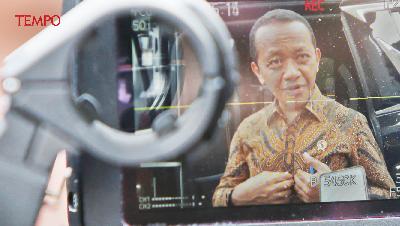
Investment Minister Bahlil Lahadalia has revoked mining permits and then reissued them. There are indications of illegal buying and selling of permits.
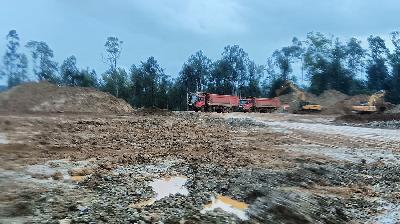
Deforestation and illegal nickel mining continues in Halmahera. It became widespread after Minister Bahlil revoked some mining licenses.

Allegedly, there are tributes to Investment Minister Bahlil Lahadalia. This coverage is supported by International Media Support
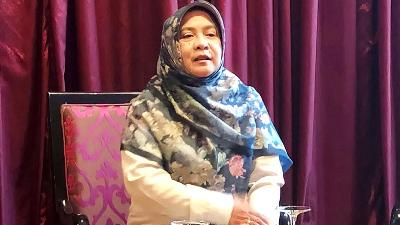
An interview with the Ministry of Environment and Forestry’s Director-General of Climate Change Mitigation Laksmi Dhewanti about the REDD+ program.
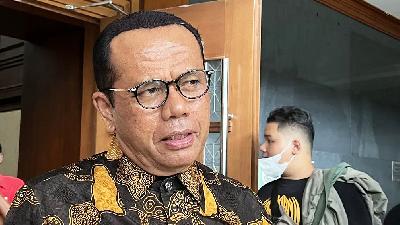
An interview with Juniver Girsang, the lawyer of Fajar Bhakti Lintas Nusantara directors, on the role of the Coordinating Minister for Maritime Affairs and Investment Luhut Pandjaitan in the internal dispute of a nickel company.

Ministry of Religious Affairs and Ministry of Agriculture’s right of reply on support for presidential candidates.

What are the functions of the cabinet minister’s special staff?

The Palestinian homeland neither originates from the distant past, nor is it a hope for the future.

A number of President Joko Widodo’s ministers campaign for their respective political parties ahead of the 2024 elections. How to scrutinize a possible misuse of state facilities?
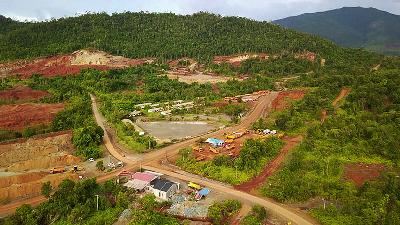
Helmut Hermawan, who admitted to bribing Deputy Justice and Human Rights Minister Eddy Hiariej, is indicted in 11 criminal cases. It is the fallout from fighting over company stocks.

The water of the Sagea River in North Maluku is polluted by nickel mining. The environmental danger is becoming more real as the price of nickel on world markets plummets.
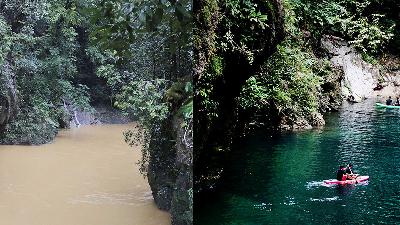
Sagea River is polluted as a result of deforestation by a number of nickel mining companies. Its water is no longer safe for drinking.

Syahrul Yasin Limpo is the sixth of Jokowi's ministers to be caught up in a corruption case. This is a sign of failure in the recruitment of cabinet members.

The appointment of the Environment Ministry Director-General of Planning appears to have been made based on a forged signature. His track record is also controversial.
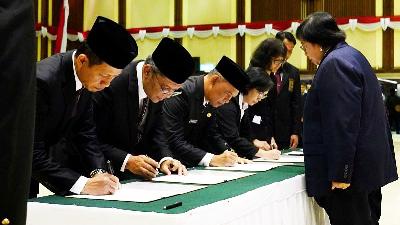
The signature of Sarwono Kusumaatmadja was used to validate the names of candidates for echelon-I officials of the Environment and Forestry Ministry. The announcement letter was issued when he was hospitalized in Malaysia.

Former government employees at the Foreign Affairs Ministry are demanding the disbursement of unpaid wages. How did it come to happen?

The National Genome Center set up in 2018 is gone. Does it change into the Biomedical and Genome Science Initiative of the Health Ministry?

A former campaign volunteer for President Jokowi is named a suspect in relation to an illegal nickel mining worth Rp5.7 trillion. A crooked syndicate that must be investigated.
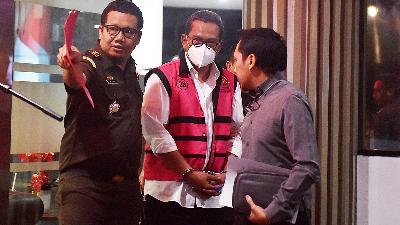
Businessman Windu Aji Sutanto is caught up in a case of illegal nickel mining at the Mandiodo Block. He is known as a broker for arranging the outcomes of legal cases.
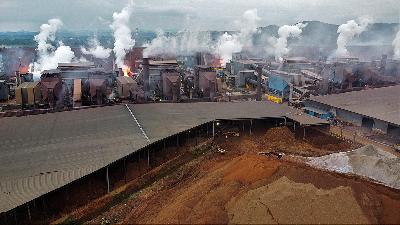
The mining downstreaming policy gives rise to issues. Mineral processing has not been optimal without processed materials being absorbed by manufacturing industries.

Minister Mahfud Md’s statement regarding a loan claim by Jusuf Hamka could be considered influence peddling. This is treading on very thin ice.
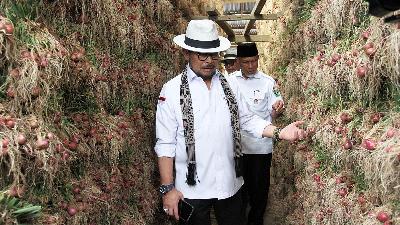
Through people close to him, Agriculture Minister Syahrul Yasin Limpo allegedly received tributes to fund his personal needs.
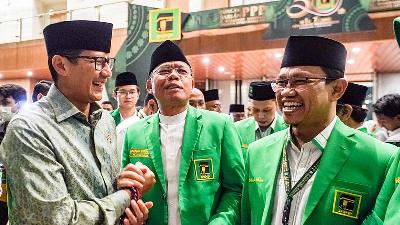
Sandiaga Uno and Erick Thohir are cozying up to political parties. Even opposition parties have been lobbied to support the current administration.

Small islands face the threat of disappearing under the water as a result of the sand mining. This worsens the abrasion caused by rising sea levels.
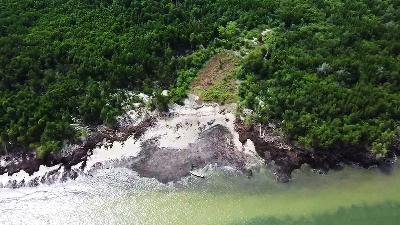
Sand mining exacerbates threats for smaller islands. It creates environmental damage and less catch for fishermen.

Police seized a Lamborghini Aventador with a fake license plate from a Russian tourist. The car disappeared twice.
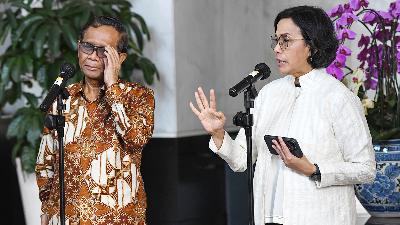
A summary of the week’s news on the huge transactions discovered in the finance ministry, the transfer of the Haris-Fatia case to the prosecutor's office, and the verdict received by the Kanjuruhan Tragedy defendants.

An investigation by Tempo found illegal nickel mining by people claiming to be close to the authority.
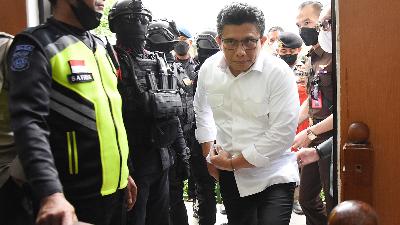
Ferdy Sambo, who is currently facing trial in the case of the killing of his adjutant, is suspected to be connected to an illegal mining bribery case involving Ismail Bolong.
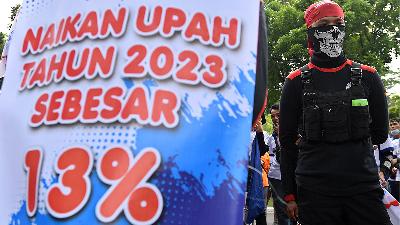
Discussions to decide the provincial minimum wage for 2023 get hot. Workers are lobbying the president to issue a discretion, while employers are suing manpower minister regulation.

Minister Erick Thohir promises to ban former corruptors from becoming directors of state-owned enterprises. Mere gimmicks are inadequate for a comprehensive cleanup of state-owned enterprises.

Nadiem Makarim has outside teams attached to some directorate-general offices at the Ministry of Education, Culture, Research and Technology. Consisting of about 400 people, these shadow organizations create waves inside the ministry.
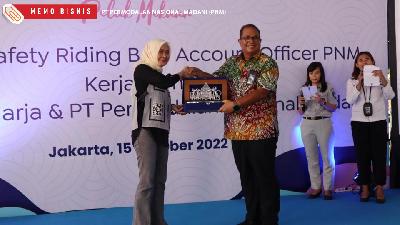
PT PNM put 100 Jakarta Branch Account Officers as training participants so they can be more aware and obey the traffic rules. #Infotempo

Barring the entry of five foreign researchers underlines the anti-science and anti-criticism stance of Environment and Forestry Minister Siti Nurbaya. This is a danger for the environment.
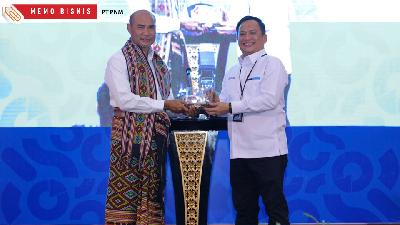
The training and provision of NIB is one of the supports for MSMEs in advancing the people's economy. #Infotempo

The Agriculture Ministry has a letter on the right of reply to Tempo’s report about the procurement of the foot-and-mouth disease vaccines.

Through this training and mentoring, PNM builds emotional relationships and provides support to customer assistants. #Infotempo

Through this training and mentoring, PNM builds emotional relationships and provides support to customer assitants. #Infotempo
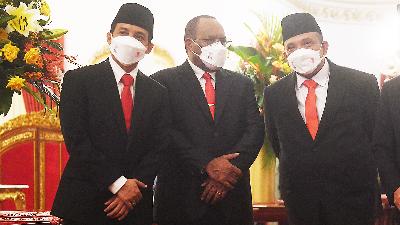
President Joko Widodo again chooses deputy ministers from political parties. It is part of his accommodation politics.
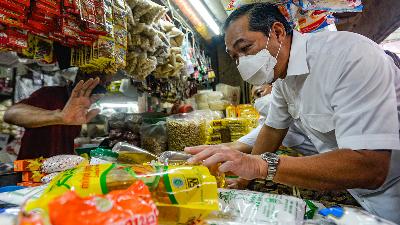
The attorney general names Lin Che Wei the fifth suspect in the graft case surrounding the export of crude palm oil and its derivatives. Investigators are also looking into Trade Minister Muhammad Lutfi’s role in the affair.

The police are investigating Rudy Salim following videos of the sale of a Lamborghini Huracán to a binary option fraud suspect, Indra Kenz. The car should not have been sold because it was imported using the ATA Carnet facility.
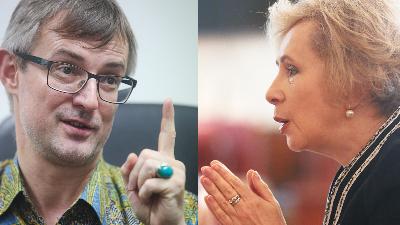
Russian Ambassador to Indonesia, Lyudmila Vorobieva, claims that the assault on Ukraine is carried out to prevent the country from being used as a weapon to attack Russia.
Meanwhile, Ukrainian Ambassador to Indonesia, Vasyl Hamianin points out that it is wrong for Russia to use such fear as an excuse to invade Ukraine and kill civilians in the process.

Letters on a note to Minister Nadiem Makarim, digital detoxification and the US-China tension.

The inspectorate-general at the ministry of education, culture, research and technology backs the accusations of plagiarism against the rector of the Semarang State University. This is a stain on the face of the education system.
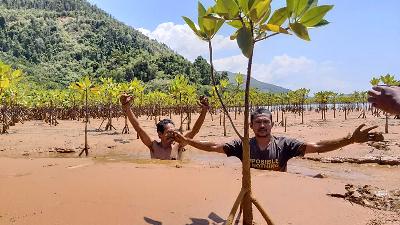
Local communities protested against Aneka Tambang for polluting the mangrove area in Tanjung Moronopo, East Halmahera North Maluku, with waste from its mining operation. The mine is changing both the waters and the lives of fishermen.

Objection of the Ministry of Villages Regarding a Government Official Suspected of Brokering Personnel Recruitment.
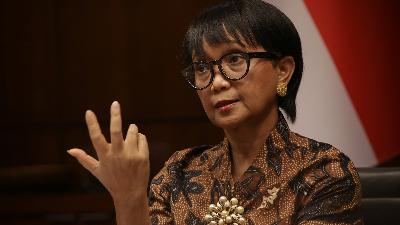
ASEAN leaders finally came to a number of consensus, such as finding a peaceful solution through dialogue and sending a special envoy to Myanmar. Further steps are still needed. Tempo interviewed Indonesian Minister of Foreign Affairs, Retno marsudi.

Ministry of Villages, Disadvantaged Regions, and Transmigration writes a response to the article titled Fees for Positions in Kalibata in Tempo English April 12-18, 2021 issue.

Taman Mini reflects the view that life is only the status quo—as though in every phenomena, every difference, there is only the everlasting.
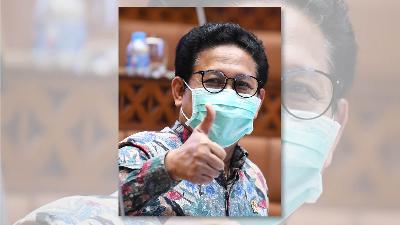
Alleged trading of postings within the Villages Ministry shows a major flaw in the practice of good governance. Placement of politicians in ministries are most often problematic.
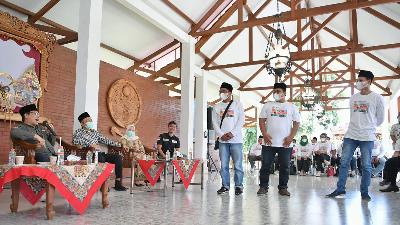
Problems abound for village assistants. These problems are in part due to structural changes at the villages ministry.

Julia Suryakusuma received an award from the Kingdom of Belgium for her struggle to voice human rights through writing. She is uncomfortable with being called a feminist.

The ministry of health clarifies a sentence on the article Vaccine Opportunist in Tempo English, 22-28 March, 2021 issue.
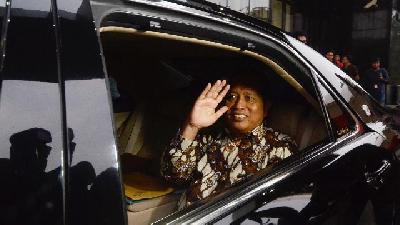
Several rectors are still in office despite having committed plagiarism. They have the support of education ministry officials
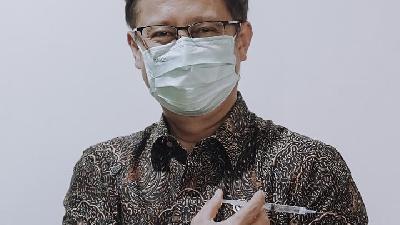
Health Minister Budi Gunadi Sadikin

Coordinating Ministry for Maritime Affairs and Investment conveys objection to the report of Dragons in Trouble in Tempo English of January 4 edition.
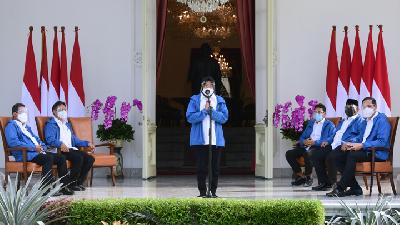
Some new cabinet ministers were selected in line with the wishes of President Joko Widodo. Candidates for the cabinet reshuffle suggested by political parties were pushed aside.
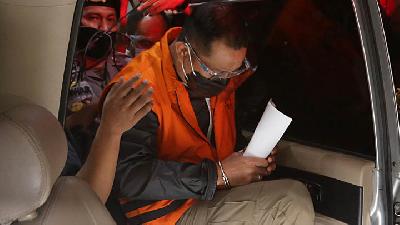
The Corruption Eradication Commission (KPK) should not allow investigation into the case of embezzlement in the social assistance program to only stop at former Social Affairs Minister Juliari Peter Batubara.

Some of the kickbacks related to the export of lobster larvae allegedly paid to the former minister of maritime affairs and fisheries are believed to have been passed on to his associates. Investigation should not stop with Edhy Prabowo.
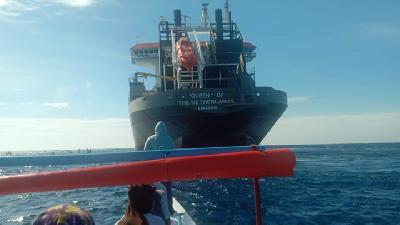
People close to South Sulawesi Governor Nurdin Abdullah are suspected of enjoying preferential treatment for getting licenses for sand mining businesses.
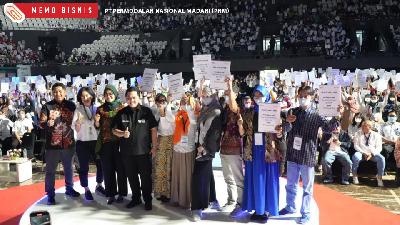
As many as 30,000 SOE-fostered MSMEs received training and NIB certificates. The training was held gradually from August to October. #Infotempo

There was no coup d’état on September 30. Or on October 1, 1965. What happened was more confusing than that—and still, there is no fitting word to name it. But after that day, the Indonesian Communist Party collapsed.

LAST week, the film Pengkhianatan G30S/PKI (The Treachery of the Communist Party 30 September Movement) was shown throughout Indonesia.

THE restructuring of Asuransi Jiwa Bersama Bumiputera 1912 has yet to happen. In fact, the state of finances of this, the oldest insurance company in Indonesia, is very worrying. As of the end of last year, Bumiputera's assets were worth just Rp15 trillion, half of the company's liabilities of Rp30 trillion. That is why the Financial Services Authority [OJK] completely reworked the management of Asuransi Jiwa Bersama Bumiputera 1912 in the middle of last month. It then appointed a number of people as statutory managers. Their job: to source fresh capital to inject. "We must protect the fates of our 6.7 million policy-holders," the OJK Deputy Chief Supervisory Commissioner II for the Non-Bank Financial Industry, Dumoly F. Pardede, told Tempo Ayu Prima Sandi by telephone last week.
On what basis did the OJK say Bumiputera is unhealthy?
In the last five years, its claims have risen very significantly, while the income from premiums did not match that. In the end, over the past five years, the management sold off assets to cover claims. If they had waited until next year, its risk-based capital (a ratio for measuring financial health) could go awry. We had to take over Bumiputera through statutory means to source new investors.

It began as the brainchild of a student communication forum. Today, Working Group (Pokja) 30 has grown into a respected anti-graft organization in East Kalimantan. Activist members of the group choose to operate from a humble house on Jalan Danau Maninjau in Samarinda.

Participant of the G30S incident, air force Lt. Col. Heru Atmodjo passed away. He denied allegations of the Indonesian Air Force special intelligence operations.

He appeared suddenly, with no discernible origin. Not many recognize the name Sjam Kamaruzaman. He made his first public appearance two years after the bloody events of the September 30 Movement (G30S). At that time, in July 1967, he was a witness in the trial of Sudisman, Secretary-General of the Indonesian Communist Party (PKI).
Previously he was more of a myth. His existence was only half-believed. The Special Bureau, the secret PKI body which he led, was initially thought to be just military propaganda to make it easier for Suharto to get rid of the PKI.
However, Sjam corroborated all charges. He said that he led the Special Bureau and made the secret plans for the G30S. He said that he intended to kidnap former Vice President Mohammad Hatta and 3rd Deputy Prime Minister Chairul Saleh, in addition to seven generals, on that bloody morning.
As someone who was tasked with influencing members of the Indonesian Military to support the PKI, he had access to military institutions. In prison, while other political detainees shuddered in fear before each questioning, Sjam would face it with a smile.
His relationship with the military was indeed like that of an “old friend.” His son recalls how, in prison, Sjam stayed in a large cell and was allowed to have a bag full of money to pay for his needs.
He was like an agent in a Hollywood movie. His children only knew their father as a businessman. He owned a roof tile factory and repair shop, and sold limestone. His wife, a worker activist at Tanjung Priok Port and administrator of the Indonesian Farmers Front, an organization under the PKI, was asked to stop working in order to protect his cover.
Who was Sjam, a man with five aliases? Who was this native of Tuban, East Java, who was an atheist yet known to be good at reciting verses from the Qur’an? Was he a double agent or just a loyal follower of PKI Chairman D.N. Aidit?
The G30S tragedy is a mystery whose secrets have never been fully uncovered. Sjam Kamaruzaman is an important figure in the chaos which is thought to have taken the lives of at least 2 million people.

According to some historical testimony, Aidit knew about the September 30 Movement. Just how involved was he?

“In line with the briefing from General (ret) Wiranto, the real force in question is hardliners, militant Muslims assembled by Kiai Ja’far Umar Thalib…”

Some time in the future we may have 300 holidays in a year. In China, the Imlek (Chinese New Year) celebrations are related to the season, but here in Indonesia they depend on the regime in power.

Tempo’s Film Selection of 2023 created seven categories for the selected films.

Stock market enjoyed a bull run in 2023. Investors bet on a frayed assumption: six times rates cut in 2024.
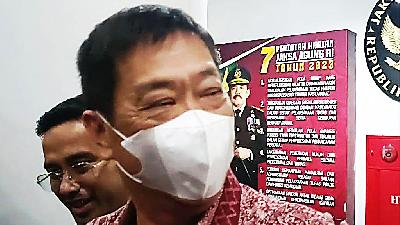
Robert Bonosusatya denies involvement in the Bangka Belitung tin corruption case. He often discusses tin business with other entrepreneurs.
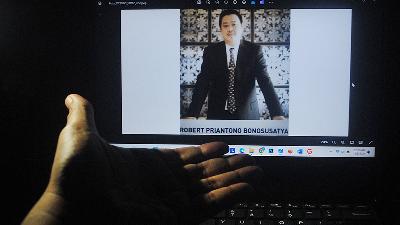
The tin corruption case in Bangka Belitung implicates PT Timah officials and smelter entrepreneurs. The name of entrepreneur Robert Bonosusatya comes under the spotlight.

Langkat regent Terbit Rencana Perangin-Angin has been accused of keeping slaves for many years using the excuse that they were drug victims undergoing rehabilitation. He was free to do this thanks to the approval of law enforcement officers.

IN the conflict involving the Namo Serdang Forest Farmers Group (KTH) that has had a license to manage 804 hectares of limited production forestland in the Langkat Forest Management Unit (KPH)
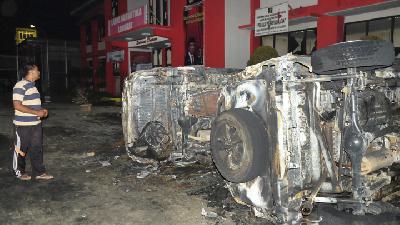
A riot at the Langkat prison for narcotics offenders is said to be the result of inmates being fed up with the rampant abuse and extortion committed by prison guards.

SAIDAH could not be happier. A short video that she shot with a camera borrowed from a neighbor has brought her to Jakarta in October. She had never traveled by plane before, let alone visited the capital city.
The 24-year-old recalled how she used the loaned camera to film her friend, a fisherwoman named Nurlina. Saidah wanted to document Nurlina's daily activities, so she had to brace the sea off Sabangko Island in Pangkajene Regency, South Sulawesi, where they both live.

Merty Katulung has grown so accustomed to the incessant roaring from the excavators that he has no trouble sleeping through the noise. His house at Kahuhu village, East Likupang District in North Minahasa, North Sulawesi, is just 300 meters away from the land controlled by mining company Mikgro Metal Perdana. However, he has heard no loud noises in the past three weeks. "Before they worked round the clock," he said last Thursday.
The company's mining operations on Bangka Island off the North Sulawesi mainland were suspended amid prolonged discord between Mikgro and Kahuku residents. Around mid-August, the Supreme Court ordered the government to revoke the company's operation permit, prompting Kahuku village chief Imanuel Kolang Tinungki to declare its activities illegal. The ruling was the result of a lawsuit against Mikgro filed at the Jakarta State Administrative Court by the people of Bangka in October 2014.

Bangka Regent Tarmizi will not budge from his position that driving Ahmadis out of his region is key to restoring peace and stability. He also refused to take responsibility for their safety if they failed to do so. "We have asked them nicely to relocate," he said last Wednesday.
Tarmizi, previously the secretary of Bangka region, claimed that there were already four fatwas that branded Ahmadis as heretics. Their presence, he said, could "weaken Muslim conviction," adding that the local community would never accept them. "It's not the end of the world for them to move," he grumbled.

Lightning flashed when M. Jusuf Ronodipuro arrived in Yogyakarta, a few years after the death of Sultan Hamengku Buwono IX in 1989. Jusuf, who founded Radio Republik Indonesia, the national radio station, planned to visit the Sultan's grave in Imogiri. One reason for this special trip, was to ask-once again-for permission to publish the Bangka Episode.

THE terrace behind Sultan Imanuddin General Hospital in Pangkalan Bun suddenly seemed like a furniture workshop. On Tuesday night last week, in the area next to the morgue, about 50 workers cut rafter-length pieces of wood. Planes and hammers noisily did their jobs.
"The regent asked for 162 coffins to be made," said Juni Gultom, 42, head of the Bina Marga Division of the Office of Public Works for West Kotawaringin Regency in Central Kalimantan. Juni was appointed by Regent Ujang Iskandar to coordinate the project, and assigned to make sure the quality of the coffins matched the specifications requested by the National Search and Rescue Agency (Basarnas). "The SAR Agency asked that the coffins use aluminum foil. They had given their approval on the shape and size."

Hasjim Djalal bases his diplomatic philosophy on old Minangkabau proverbs. He was once punished by being posted to the smallest country in Africa for speaking up at official functions.

In the village of Lendang Nangka, East Lombok, residents have attained self-sufficiency in their clean water supply. In addition to receiving an award for their efforts, the villages water supply has made it easier for residents to conduct their business.

Tana Toraja is known to be very familiar with death, an animist tradition that survives until today. One custom that is still upheld is ma’nene, a pilgrimage to the grave, where they clean up the area and change the clothes of the dead. Last September, Irmawati from Tempo had the opportunity to take part in the aluk todolo (the ancestor’s tradition) at Bululangkang village in North Toraja regency, South Sulawesi.
Independent journalism needs public support. By subscribing to Tempo, you will contribute to our ongoing efforts to produce accurate, in-depth and reliable information. We believe that you and everyone else can make all the right decisions if you receive correct and complete information. For this reason, since its establishment on March 6, 1971, Tempo has been and will always be committed to hard-hitting investigative journalism. For the public and the Republic.